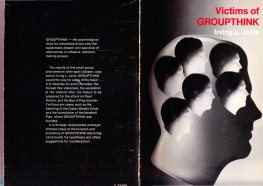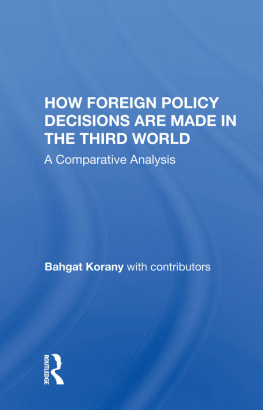Janis - Victims of Groupthink: A Psychological Study of Foreign-Policy Decisions and Fiascoes
Here you can read online Janis - Victims of Groupthink: A Psychological Study of Foreign-Policy Decisions and Fiascoes full text of the book (entire story) in english for free. Download pdf and epub, get meaning, cover and reviews about this ebook. year: 1972, genre: Politics. Description of the work, (preface) as well as reviews are available. Best literature library LitArk.com created for fans of good reading and offers a wide selection of genres:
Romance novel
Science fiction
Adventure
Detective
Science
History
Home and family
Prose
Art
Politics
Computer
Non-fiction
Religion
Business
Children
Humor
Choose a favorite category and find really read worthwhile books. Enjoy immersion in the world of imagination, feel the emotions of the characters or learn something new for yourself, make an fascinating discovery.
Victims of Groupthink: A Psychological Study of Foreign-Policy Decisions and Fiascoes: summary, description and annotation
We offer to read an annotation, description, summary or preface (depends on what the author of the book "Victims of Groupthink: A Psychological Study of Foreign-Policy Decisions and Fiascoes" wrote himself). If you haven't found the necessary information about the book — write in the comments, we will try to find it.
Janis: author's other books
Who wrote Victims of Groupthink: A Psychological Study of Foreign-Policy Decisions and Fiascoes? Find out the surname, the name of the author of the book and a list of all author's works by series.
Victims of Groupthink: A Psychological Study of Foreign-Policy Decisions and Fiascoes — read online for free the complete book (whole text) full work
Below is the text of the book, divided by pages. System saving the place of the last page read, allows you to conveniently read the book "Victims of Groupthink: A Psychological Study of Foreign-Policy Decisions and Fiascoes" online for free, without having to search again every time where you left off. Put a bookmark, and you can go to the page where you finished reading at any time.
Font size:
Interval:
Bookmark:

Janis, Irving L.
This book was produced in EPUB format by the Internet Archive.
The book pages were scanned and converted to EPUB format automatically. This process relies on optical character recognition, and is somewhat susceptible to errors. The book may not offer the correct reading sequence, and there may be weird characters, non-words, and incorrect guesses at structure. Some page numbers and headers or footers may remain from the scanned page. The process which identifies images might have found stray marks on the page which are not actually images from the book. The hidden page numbering which may be available to your ereader corresponds to the numbered pages in the print edition, but is not an exact match; page numbers will increment at the same rate as the corresponding print edition, but we may have started numbering before the print book's visible page numbers. The Internet Archive is working to improve the scanning process and resulting books, but in the meantime, we hope that this book will be useful to you.
The Internet Archive was founded in 1996 to build an Internet library and to promote universal access to all knowledge. The Archive's purposes include offering permanent access for researchers, historians, scholars, people with disabilities, and the general public to historical collections that exist in digital format. The Internet Archive includes texts, audio, moving images, and software as well as archived web pages, and provides specialized services for information access for the blind and other persons with disabilities.
Created with abbyy2epub (v.1.7.6)
I
A psychological study of foreign-policy decisions and fiascoes
Irving L. Janis
Houghton Milllin Company Boston
Atlanta Dallas (leneva, III. Hopewell, N J. Palo Alto
Selections on pages 62, 63, 170, and 172-175 are from Memoirs by
George Kennan, by permission of Atlantic-Little, Brown and Co. Copyright
1967 by George F. Kennan.
Selections on pages 127-131 are from THE SECRET SEARCH FOR PEACE IN VIETNAM, by David Kraslow and Stuart H. Loory. Copyright 1968 by David Kraslow and Stuart H. Loory. Reprinted by permission of Random House, Inc. and The Sterling Lord Agency.
Copyright 1972 by Houghton Mifflin Company. All rights reserved. No part of this work may be reproduced or transmitted in any form or by any means, electronic or mechanical, including photocopying and recording, or by any information storage or retrieval system, without permission in writing from the publisher.
Printed in the U.S.A.
Library of Congress Catalog Card Number: 72-4393 ISBN: 0-395 14002-1 Hardbound 0 395 14044 7 Paper'hound
The main theme of this book occurred to me while reading Arthur M. Schlesingers chapters on the Bay of Pigs in A Thousand Days. At first, I was puzzled: How could bright, shrewd men like John F. Kennedy and his advisers be taken in by the CIAs stupid, patchwork plan? I began to wonder whether some kind of psychological contagion, similar to social conformity phenomena observed in studies of small groups, had interfered with their mental alertness. I kept thinking about the implications of this notion until one day I found myself talking about it, in a seminar of mine on group psychology at Yale University. I suggested that the poor decisionmaking performance of the men at those White House meetings might be akin to the lapses in judgment of ordinary citizens who become more concerned with retaining the approval of the fellow members of their work group than with coming up with good solutions to the tasks at hand.
Shortly after that, when I reread Schlesingers account, I was struck by some observations that earlier had escaped my notice. These observations began to fit a specific pattern of concurrence-seeking behavior that had impressed me time and again in my research on other kinds of face-to-face groups, particularly when a we-feeling of solidarity is running high. Additional accounts of the Bay of Pigs yielded more such observations, leading me to conclude that group processes had been subtly at work, preventing the members of Kennedys team from debating the real issues posed by the riAs plan and from carefully appraising its serious risks.
Then in Joseph de Riveras The Psychological Dimension of Foreign Policy, I found an impressive example of excluding a deviant from Trumans group of advisers during the period of the ill-fated Korean War derisions Dc Riveras comments about the groups behavior prompted me to look further into that series of decisions and soon I encountered evidence
of other manifestations of group processes, like those apparently operating in the Bay of Pigs decision.
By this time, I was sufficiently fascinated by what I began to call the groupthink hypothesis to start looking into a fairly large number of historical parallels. I selected for intensive analysis two additional United States foreign-policy decisions and again found consistent indications of the same kind of detrimental group processes.
The first section of this book presents four case studies of major fiascoes, resulting from poor decisions made during the administrations of four American presidents Franklin D. Roosevelt (failure to be prepared for the attack on Pearl Harbor), Harry S Truman (the invasion of North Korea), John F. Kennedy (the Bay of Pigs invasion), and Lyndon B. Johnson (escalation of the Vietnam War). Each of these decisions was a group product, issuing from a series of meetings of a small body of government officials and advisers who constituted a cohesive group. And in each instance, the members of the policy-making group made incredibly gross miscalculations about both the practical and moral consequences of their decisions.
The second section, for comparative purposes, presents two case studies of well worked out decisions made by similar groups whose members made realistic appraisals of the consequences. One of these is the course of action chosen by the Kennedy administration during the Cuban missile crisis in October 1962. This decision, made by almost the same cast of characters that had approved the Bay of Pigs invasion plan in 1961, was arrived at very carefully, in a group atmosphere conducive to independent critical thinking, unlike that which prevailed in the earlier decision. Similarly, the second counterpoint example deals with the hardheaded way that planning committees in the Truman administration evolved the Marshall Plan in 1948. These two case studies indicate that policy-making groups do not always suffer the adverse consequences of group processes, that the quality of the groups decision-making activities depends upon current conditions that influence the group atmosphere.
The case studies are based mainly on secondary sources memoirs and published documents, such as the Pentagon Papers which are familiar to scholars who have studied these foreign-policy decisions. What I try to do is to show how the evidence at hand can be viewed as forming a consistent psychological pattern, in the light of what is known about group dynamics. Consequently, well-known historical facts, along with some less well-known observations that have generally been passed over as unimportant, arc interpreted in a way quite different from how such facts are treated in the writings of historians and political scientists who have studied the various policy decisions.
Since my purpose is to describe and explain the psychological processes that are at work, rather than to establish historical continuities, I do not
Next pageFont size:
Interval:
Bookmark:
Similar books «Victims of Groupthink: A Psychological Study of Foreign-Policy Decisions and Fiascoes»
Look at similar books to Victims of Groupthink: A Psychological Study of Foreign-Policy Decisions and Fiascoes. We have selected literature similar in name and meaning in the hope of providing readers with more options to find new, interesting, not yet read works.
Discussion, reviews of the book Victims of Groupthink: A Psychological Study of Foreign-Policy Decisions and Fiascoes and just readers' own opinions. Leave your comments, write what you think about the work, its meaning or the main characters. Specify what exactly you liked and what you didn't like, and why you think so.











